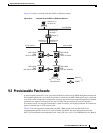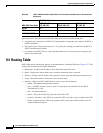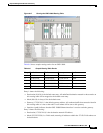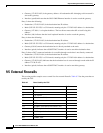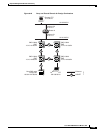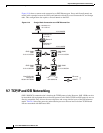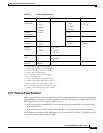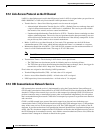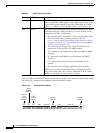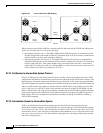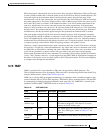
9-27
Cisco ONS 15600 Reference Manual, R7.2
Chapter 9 Management Network Connectivity
9.7.1 Point-to-Point Protocol
9.7.1 Point-to-Point Protocol
PPP is a data link (Layer 2) encapsulation protocol that transports datagrams over point-to-point links.
Although PPP was developed to transport IP traffic, it can carry other protocols including the OSI CLNP.
PPP components used in the transport of OSI include:
•
High-level data link control (HDLC)—Performs the datagram encapsulation for transport across
point-to-point links.
•
Link control protocol (LCP)—Establishes, configures, and tests the point-to-point connections.
CTC automatically enables IP over PPP whenever you create an SDCC or LDCC. The SDCC or LDCC
can be provisioned to support OSI over PPP.
Table 9-8 TCP/IP and OSI Protocols
OSI Model IP Protocols OSI Protocols IP-OSI Mediation
Layer 7
Application
•
TL1
•
FTP
•
HTTP
•
Telnet
•
IIOP
•
TARP
1
1. TARP = TID Address Resolution Protocol
•
TL1 (over
OSI)
•
FTAM
2
•
ACSE
3
2. FTAM = File Transfer and Access Management
3. ACSE = Association-control service element
•
T–TD
4
•
FT–TD
5
4. T–TD = TL1–Translation Device
5. FT–TD = File Transfer—Translation Device
Layer 6
Presentation
•
PST
6
6. PST = Presentation layer
—
Layer 5
Session
•
Session —
Layer 4
Transport
•
TCP
•
UDP
•
TP (Transport)
Class 4
•
IP-over-CLNS
7
tunnels
7. CLNS = Connectionless Network Layer Service
Layer 3
Network
•
IP
•
OSPF
•
CLNP
8
•
ES-IS
9
•
IS-IS
10
8. CLNP = Connectionless Network Layer Protocol
9. ES-IS = End System-to-Intermediate System
10. IS-IS = Intermediate System-to-Intermediate System
Layer 2 Data
link
•
PPP
•
PPP
•
LAP-D
11
11. LAP-D = Link Access Protocol on the D Channel
Layer 1
Physical
DCC, LAN, fiber,
electrical
DCC, LAN, fiber, electrical —



